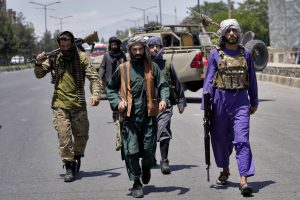A year ago the Western-backed Afghan government collapsed and the Taliban, 20 years after their ouster, seized power once more in Afghanistan. Since then conditions in the country have worsened, with a financial crisis working in tandem with a food crisis, followed by natural disasters and a new war in Europe distracting attention from Afghanistan.
“The Taliban has clearly prioritized its religious and ideological agenda over the economy and the humanitarian needs of the Afghan people,” said Justine Fleischner, director of research at Afghan Peace Watch (APW), in the following interview with The Diplomat’s Catherine Putz. Fleischner identifies key developments in the past year, from new security risks to the revival of age-old repression of women, and points out that the Taliban are ill-equipped to manage these overlapping crises.
It’s been about a year since the collapse of the Western-backed Afghan government. What would you say are the most important developments since then with regard to Afghanistan?
There are three major areas of concern we are monitoring closely: the economy and lack of inclusive governance; human rights abuses such as collective punishment and extrajudicial killings; and the reemergence of transnational terrorist threats.
So far, the Taliban have ignored both domestic and international pressure to form an inclusive government. Technocrats have been sidelined in favor of the Taliban’s core leadership. This includes ministerial posts such as economy, finance, water and energy, civil aviation, and rural rehabilitation and development. Ethnic Pashtuns occupy over 90 percent of these top positions, leaving little room for other ethnic and religious minorities. There are no women present in the Taliban’s government and decree after decree has denied women access to education, employment, and freedom of movement. For war widows and female-headed households this is tantamount to a death sentence.
Second, the human rights situation in Afghanistan is becoming increasingly problematic as former Afghan security forces, ethnic and religious minorities, women right’s activists, and journalists are subjected to forced disappearances, torture, and extrajudicial killings, now widely documented by human rights groups. Afghan Peace Watch (APW) maintains a database on these kinds of incidents, including information provided directly to APW by victims’ families. In Panjshir, for instance, where there is significant armed resistance to the Taliban, civilians are subjected to collective punishment and young men have been detained, tortured, and killed by the Taliban.
Finally, the Taliban’s counterterrorism agenda may not be fully aligned with regional and global priorities. In February, the U.N. Sanctions Monitoring Team first highlighted increased al-Qaida and Islamic State Khorasan (ISIS-K or ISK) activity. Weapon proliferation from Afghanistan also remains a very real and immediate risk as the Taliban demonstrate low technical and institutional capacity. The Taliban maintain longstanding ties with a host of regional terrorist groups, including the Pakistani Taliban (TTP), Islamic Movement of Uzbekistan (IMU), and Kashmiri groups. These terrorist networks may be difficult to monitor and disrupt due to an overreliance on the Taliban, which share personal and ideological ties with these groups.
So far, the spike in ISIS-K activity under the Taliban has been particularly concerning. Previously, the Taliban were responsible for the bulk of terrorist attacks inside Afghanistan, which explains the overall decrease in violence noted by some observers.

































